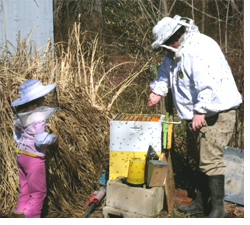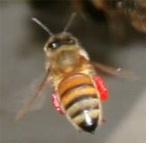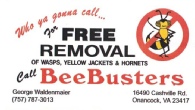|








|
-
|
Beginning Beekeeping Class - SOLD OUT
Please note this class is full and ticket sales have been suspended. Only persons who have purchased a valid ticket may attend. To be held on three consecutive Saturdays January 17th, 24th, and 31st, 2026 from 10:00 AM to 3:00 PM
Eastern Shore Library
Parksley, Virginia
|
|
Regular Meeting
Saturday, February 14th, 2026 - 10:00 AM
Barrier Islands Center
Machipongo, Virginia
|
|
Yearly BGES Membership Renewal : Download the BGES membership application here.
|


 Gentle Honey Bees Gentle Honey Bees
It is unfortunate that many people have been taught to be afraid of Honey Bees. Many times people cannot even recognize the difference among Honey Bees, Wasps, Hornets, Bumblebees or Yellow Jackets. They categorize all insects that buzz and sting into the same group. This is wrong.
Ironically, beekeepers are seldom stung. The late Dr. G.H. Gale, a leading authority on Honeybees and a Honey Bee geneticist with Dadant and Sons was responsible for producing a hybrid line of Honey Bees bred for gentleness and high honey productivity called the "Midnite" Truthfully, Honey Bees sting only when they feel they or their home is being threatened. The drone or male Honey Bee cannot sting at all and the queen bee rarely stings. However, on rare occasions the worker Honey Bee will sting if she feels the entrance to her give is threatened. The only consolation for the person who has been stung is that after she stings, her stinger is pulled from her body and she soon dies.
|
How Honey Bees work
Most all flowers produce a sweet liquid to to attract insects, primarily Honey Bees, so that pollination can take place and assure the survival of that plant species. Honey Bees make honey from nectar found inside the flower blossom. Field worker Honey Bees collect the nectar and carry it back to the hive in pouches within their body. The Field. Worker Honey Bee gives the nectar to young Worker Honey Bees back at the hive, who then place the nectar in a beeswax comb made up of six sided cells. The excess water is then evaporated from the nectar. After a period of time the nectar is transformed into Pure Honey.
Some workers collect nectar, some collect pollen and some do both. In terms of economic value the Workers that collect pollen are the most important to you and I. Honey is just he sweet secondary reward that we collect from Honeybees. If Honey Bees ceased to exist today, about one-third (1/3) of all foods we eat would disappear. Why? Because of pollination. The worker that collects pollen from the flowers packs it into pellets on her hind legs. As she ravels from flower to flower, the pollen brushes off onto a special pollen receiving structure called the stigma in the center of the flower. This process is called Pollination and allows all flowering crops to reproduce. The outcome is fruit, vegetables, nuts and a wide variety of seeds that are used for human and animal foods. For this reason many people keep bees on farms and near gardens.
|
 Thinking about Honey Bees as a hobby? Thinking about Honey Bees as a hobby?
The Beekeepers Guild of the Eastern Shore (the BGESVA) is ready to teach you what you need to know about getting started with your own backyard beehive. We have classes for folks who want to learn where to get all their equipment, their first honey bees, and how to extract their first sweet honey. Club mentors will help you learn all about your new bees. Our new beekeeper course is taught in November so you will be ready for bees in the spring time. You are welcome to visit at any of our monthly meetings which are all open to the public. We hope to see you there!
|
 From Member Donna Fauber: From Member Donna Fauber:
"I crossed paths with George Waldenmaier this fall. He spoke to our club a year or two ago and I have sent several people to him..
George removes any bee, EXCEPT honey bees, his service is free and the bees are sent to a lab where the stingers are removed and anti-venom is made.”
Call George Waldenmaier at (757) 787-3013.For honey bee colonies in buildings and swarms, BGES offers removal services, Just click on our Local Swarms list. PLEASE DO NOT CALL AN EXTERMINATOR!
|
|
|





